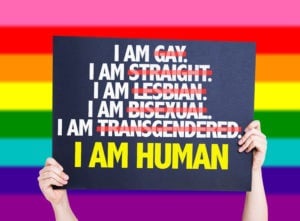Understanding Anxiety and Depression for LGBTQ People
Understanding Anxiety and Depression for LGBTQ People

Updated October 2020
If you’re lesbian, gay, bisexual, transgender, or queer(LGBTQ) or are exploring your sexual orientation or gender identity, and you struggle with anxiety or depression, let’s start by putting things into context. By that I mean let’s think through powerful life experiences that fundamentally impact your sense of well-being.
Anxiety and Depression for Lesbians, Gay Men, Bisexuals, and Transgender People
Somewhere between 30 and 60 percent of lesbians, gay men, bisexuals, or transgender people deal with anxiety and depression at some point in their lives. That rate is 1.5 to 2.5 times higher than that of their straight or gender-conforming counterparts. It’s a strikingly high number, and it raises a lot of questions. While the full answer is undoubtedly complicated as to why you or your LGBTQ loved ones are more apt to struggle with anxiety or depression, here’s where context is key to understanding it for yourself.
It’s About Context
If you’re LGBTQ, I’d wager a bet that you’re good at reading a situation to determine how much you can safely be yourself. This skill, while adaptive, comes at a cost because it was developed in response to being subjected to high levels of persistent prejudice and discrimination.
For example, just ask any teenager who’s attracted to people of the same sex (or think back to your own experiences), and you’ll hear (or remember) vivid examples of the fear, shame, and ridicule that lead to learning how to read a situation.
Being highly attuned to context as a lesbian, gay man, bisexual, or transgender person shapes your inner world, too. It affects how you think and feel about yourself. In response to an outside world full of negative messages about what it means to be attracted to people of the same sex or not cisgender, many people come to view themselves as deeply flawed, unlovable, unworthy, and hopeless.
Minority Stress
Psychologists refer to this contextual process of dealing with persistent prejudice and discrimination as minority stress. Many studies have shown that it has powerful, lasting, and negative impacts on the mental health and well-being of LGBTQ people. Bottom line: It creates a situation ripe for struggling with anxiety and depression.
Your Life in a Larger Context
Coping with minority stress does not tell the whole story, though, in the lives of lesbians, gay men, bisexuals, or transgender individuals. There’s way more to each person’s life than that: Camaraderie, pride, strength, and sense of belonging are found in community, friendship, and the love of other LGBTQ people and their supportive allies. All of us, whether gay, straight, cisgender, or not — or somewhere in between — are more than a constellation of the difficulties that we’ve had to face.
If You’re Searching for Help
Many factors determine the ways that anxiety and depression are part of your life. Our bodies, predispositions, and life experiences all play a role. My advice for LGBTQ people seeking help with their anxiety or depression is this: Seek a professional who gets the larger contextual picture and what it means to be you.
Find a LGBTQ-Affirming Mental Health Care Provider
- WikiHow: How to Find a Supportive Therapist if You Are Lesbian, Gay, Bisexual or Transgender
- Cleveland Clinic: Why You Should Come Out to Your Doctor
- Human Rights Campaign: Coming Out to Your Doctor
About the Author

Brad Brenner, Ph.D., is a counseling psychologist and the founder and Clinical Director of the Therapy Group of DC and the Therapy Group of NYC. He also cofounded WithTherapy and The Capital Therapy Project, a community-based psychotherapy training institute.












